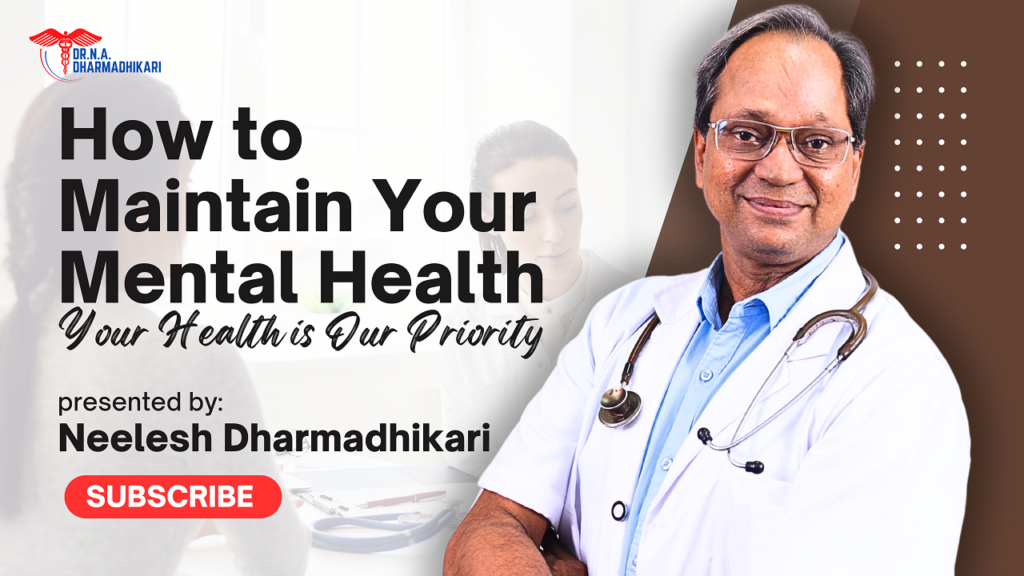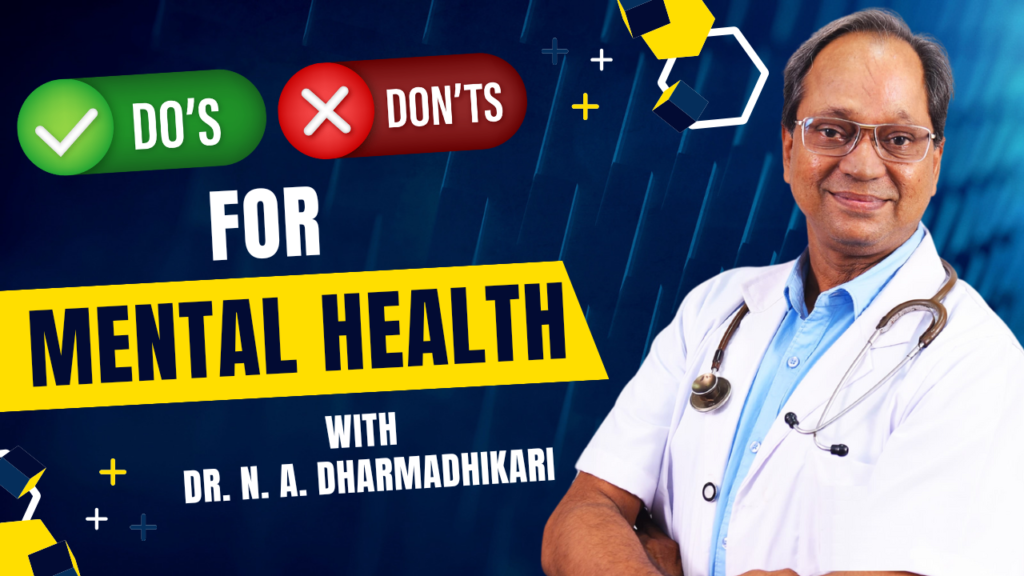Managing stress effectively is crucial for maintaining mental health and physical well-being. Stress is a part of life, but how we manage it, can greatly impact and make a significant difference in our well-being. How to effectively cope up with stress and reduce it, here are some practical do’s and don’ts for effectively managing stress for all:
मानसिक स्वास्थ्य और शारीरिक कल्याण को बनाए रखने के लिए तनाव का प्रभावी ढंग से प्रबंधन करना महत्वपूर्ण है। तनाव जीवन का एक हिस्सा है, लेकिन हम इसे कैसे प्रबंधित करते हैं, यह हमारी भलाई पर काफी प्रभाव डाल सकता है और इसमें महत्वपूर्ण अंतर ला सकता है। तनाव से प्रभावी ढंग से कैसे निपटें और इसे कैसे कम करें, सभी के लिए तनाव को प्रभावी ढंग से प्रबंधित करने के लिए यहां कुछ व्यावहारिक क्या करें और क्या न करें के बारे में बताया गया है:
Do’s: क्या करें:
Identify Stressors: तनाव पैदा करने वाले कारकों को पहचानें:
Do identify the sources of stress in your life, such as work pressure, relationship issues or financial concerns.
अपने जीवन में तनाव के स्रोतों की पहचान अवश्य करें, जैसे काम का दबाव, रिश्ते के मुद्दे या वित्तीय चिंताएँ।
Identify Stress Triggers: तनाव ट्रिगर को पहचानें:
Do recognize what situations, thoughts and behaviours trigger your stress. Awareness is the first step in managing stress effectively.
यह अवश्य पहचानें कि कौन सी स्थितियाँ, विचार और व्यवहार आपके तनाव का कारण बनते हैं। तनाव को प्रभावी ढंग से प्रबंधित करने के लिए जागरूकता पहला कदम है।
Maintain a Positive Mindset: सकारात्मक मानसिकता बनाए रखें:
Do focus on positive thoughts, practice gratitude, cultivate optimism and learn from challenges to foster resilience and reduce stress.
सकारात्मक विचारों पर ध्यान केंद्रित करें, कृतज्ञता का अभ्यास करें, आशावाद विकसित करें और लचीलेपन को बढ़ावा देने और तनाव को कम करने के लिए चुनौतियों से सीखें।
Set Realistic Goals: यथार्थवादी लक्ष्य निर्धारित करें:
Do set achievable goals and prioritize tasks to avoid feeling overwhelmed and reduce stress levels. Break tasks into manageable steps, set achievable goals and celebrate small-small successes also and victories to build confidence and reduce stress.
अभिभूत महसूस करने से बचने और तनाव के स्तर को कम करने के लिए प्राप्त करने योग्य लक्ष्य निर्धारित करें और कार्यों को प्राथमिकता दें। आत्मविश्वास बढ़ाने और तनाव कम करने के लिए कार्यों को प्रबंधनीय चरणों में विभाजित करें, प्राप्त करने योग्य लक्ष्य निर्धारित करें और छोटी-छोटी सफलताओं और जीत का भी जश्न मनाएं।
Practice Time Management: समय प्रबंधन का अभ्यास करें:
Do use time management strategies like creating schedules, setting priorities, delegating tasks, setting boundaries and taking breaks to manage your workload effectively.
अपने कार्यभार को प्रभावी ढंग से प्रबंधित करने के लिए समय प्रबंधन रणनीतियों का उपयोग करें जैसे शेड्यूल बनाना, प्राथमिकताएं निर्धारित करना, कार्य सौंपना, सीमाएं निर्धारित करना और ब्रेक लेना।
Practice Relaxation Techniques: विश्राम तकनीकों का अभ्यास करें:
Do incorporate and engage in relaxation methods like deep breathing, meditation, yoga or progressive muscle relaxation to calm your mind and body.
अपने मन और शरीर को शांत करने के लिए गहरी सांस लेने, ध्यान, योग या प्रगतिशील मांसपेशी विश्राम जैसी विश्राम विधियों को शामिल करें और उनमें संलग्न रहें।
Stay Active, Exercise Regularly: सक्रिय रहें, नियमित व्यायाम करें:
Do engage in regular physical activity or exercise as it helps release endorphins and improve mood. Walking, jogging, swimming or dancing can reduce stress, reduce tension and improve mood.
नियमित शारीरिक गतिविधि या व्यायाम में संलग्न रहें क्योंकि यह एंडोर्फिन जारी करने और मूड में सुधार करने में मदद करता है। पैदल चलना, टहलना, तैराकी या नृत्य करने से तनाव/ दबाव कम हो सकता है, टेंशन कम हो सकता है और मूड में सुधार हो सकता है।
Do Maintain a Healthy Lifestyle: स्वस्थ जीवनशैली बनाए रखें:
Eat nutritious foods; eat a balanced diet and regularise mealtimes. Get adequate sleep and avoid excessive alcohol, caffeine and tobacco use to support your physical, mental, overall well-being and resilience against stress.
पौष्टिक आहार खायें; संतुलित आहार लें और भोजन का समय नियमित करें। अपने शारीरिक, मानसिक, समग्र स्वास्थ्य और तनाव के प्रति लचीलेपन को बनाए रखने के लिए पर्याप्त नींद लें और अत्यधिक शराब, कैफीन और तंबाकू के सेवन से बचें।
Learn to Say No: ना कहना सीखें:
Do Set boundaries and learn to say no to additional responsibilities and commitments that may contribute to stress overload.
सीमाएँ निर्धारित करें और अतिरिक्त ज़िम्मेदारियों और प्रतिबद्धताओं को ना कहना सीखें जो तनाव की अधिकता में योगदान कर सकते हैं।
Express Yourself: स्वयं को अभिव्यक्त करें:
Do Share your thoughts and feelings with trusted individuals, consider journaling as a way to express and process emotions.
अपने विचारों और भावनाओं को विश्वसनीय व्यक्तियों के साथ साझा करें, जर्नलिंग को भावनाओं को व्यक्त करने और संसाधित करने का एक तरीका मानें।
Engage In Enjoyable Activities, Prioritize Self-Care: आनंददायक गतिविधियों में संलग्न रहें, स्व-देखभाल को प्राथमिकता दें:
Take time for self-care activities such as exercise, hobbies, reading or spending time outdoors to rejuvenate and recharge. Engage yourself in interests and activities that bring you joy and relaxation.
तरोताजा होने और पुनर्भरण होने के लिए व्यायाम, शौक, पढ़ना या बाहर समय बिताने जैसी आत्म-देखभाल गतिविधियों के लिए समय निकालें। अपने आप को उन रुचियों और गतिविधियों में व्यस्त रखें जो आपको आनंद और विश्राम प्रदान करें।
Do Seek Support: सहायता अवश्य लें:
Reach out to friends, family, family Doctors, Mental Health Professionals, support groups for emotional support and connection during stressful times for advice or counselling if stress becomes overwhelming.
यदि तनाव अत्यधिक बढ़ जाए तो सलाह या परामर्श के लिए तनावपूर्ण समय के दौरान भावनात्मक समर्थन और संबंध के लिए दोस्तों, परिवार, परिवार के डॉक्टरों, मानसिक स्वास्थ्य पेशेवरों, सहायता समूहों से संपर्क करें।
Don’ts: क्या न करें:
Isolating Yourself: अपने आप को अलग करना:
Don’t Isolate or withdraw yourself from social connections during stressful times. Maintaining supportive relationships and social interactions can provide comfort and perspective during stressful times.
तनावपूर्ण समय के दौरान अपने आप को सामाजिक संपर्कों से अलग न करें या दूर न रखें। तनावपूर्ण समय के दौरान सहायक रिश्ते और सामाजिक मेलजोल बनाए रखने से आराम और परिप्रेक्ष्य मिल सकता है।
Neglecting Self-Care: स्वयं की देखभाल की उपेक्षा:
Avoid neglecting your physical health, mental health and well-being by overworking, skipping meals, ignoring the need for relaxation and downtime. Don’t Neglect self-care activities such as taking breaks, practicing self-compassion, engaging in self-soothing techniques, practicing hobbies or engaging in activities can bring you joy and relaxation.
अधिक काम करने, भोजन छोड़ने, विश्राम और खाली समय की आवश्यकता को नजरअंदाज करके अपने शारीरिक स्वास्थ्य, मानसिक स्वास्थ्य और खुशहाली की उपेक्षा करने से बचें। स्व-देखभाल गतिविधियों की उपेक्षा न करें जैसे कि ब्रेक लेना, आत्म-करुणा का अभ्यास करना, आत्म-सुखदायक तकनीकों में संलग्न होना, शौक का अभ्यास करना या उन गतिविधियों में संलग्न होना आपको खुशी और आराम दे सकता है।
Avoid Unhealthy Coping Mechanisms: अस्वास्थ्यकर मुकाबला तंत्र से बचें:
Don’t rely upon unhealthy coping mechanisms like excessive alcohol, overeating and procrastination to deal with stress.
तनाव से निपटने के लिए अस्वास्थ्यकर मुकाबला तंत्र जैसे अत्यधिक शराब, अधिक खाना और काम टालने पर भरोसा न करें।
Don’t Suppress Emotions: भावनाओं को दबाएं नहीं:
Don’t Suppress and ignore your emotions. Acknowledge and express your feelings in healthy ways to prevent emotional build-up.
अपनी भावनाओं को दबाएँ और अनदेखा न करें। भावनात्मक वृद्धि को रोकने के लिए अपनी भावनाओं को स्वस्थ तरीकों से स्वीकार करें और व्यक्त करें।
Avoid Over committing: अति प्रतिबद्धता से बचें:
Don’t be overcommitted and take on work more than you can handle. Learn to delegate tasks and prioritize self-care.
अति प्रतिबद्ध न हों और जितना आप संभाल सकते हैं उससे अधिक काम अपने ऊपर न लें। कार्यों को सौंपना और आत्म-देखभाल को प्राथमिकता देना सीखें।
Don’t Engage in Negative Self-Talk: नकारात्मक आत्म-चर्चा में न उलझें:
Don’t engage in negative self-talk and harsh self-criticism. Practice self-compassion and positive affirmations.
नकारात्मक आत्म-चर्चा और कठोर आत्म-आलोचना में संलग्न न हों। आत्म-करुणा और सकारात्मक पुष्टि का अभ्यास करें।
Excessive Screen Time: अत्यधिक स्क्रीन टाइम:
Don’t spend excessive time on screens such as smart phones, televisions and computers, especially before bedtime, also those negative news and social media contents which may contribute to stress and disrupt your quality sleep.
विशेष रूप से सोने से पहले स्मार्ट फोन, टेलीविजन और कंप्यूटर जैसी स्क्रीन पर अत्यधिक समय न बिताएं, साथ ही उन नकारात्मक समाचारों और सोशल मीडिया सामग्री पर भी ध्यान न दें जो तनाव में योगदान कर सकती हैं और आपकी गुणवत्तापूर्ण नींद को बाधित कर सकती हैं।
Don’t Skip Physical Activity: शारीरिक गतिविधियां न छोड़ें:
Don’t Neglect regular exercise. Physical activity is crucial for managing stress and promoting overall well-being.
नियमित व्यायाम की उपेक्षा न करें। तनाव को प्रबंधित करने और समग्र कल्याण को बढ़ावा देने के लिए शारीरिक गतिविधि महत्वपूर्ण है।
Avoid Bottling Up Emotions: भावनाएँ भरने से बचें/भावनाओं को बोतलबंद करने से बचें:
Avoid suppressing emotions and bottling up feelings. Instead, express yourself through healthy outlets like talking to someone you trust, journaling and creative activities.
भावनाओं को दबाने और भावनाओं को बोतल में बंद करने से बचें। इसके बजाय, अपने आप को स्वस्थ माध्यमों जैसे किसी विश्वसनीय व्यक्ति से बात करना, जर्नलिंग और रचनात्मक गतिविधियों के माध्यम से अभिव्यक्त करें।
Don’t Say Yes When You Want To Say No: जब आप ना कहना चाहें तो हाँ मत कहें:
Avoid taking on too many responsibilities or saying yes to everything. Learn to prioritize and say no when necessary to prevent overwhelm and burnout.
बहुत ज़्यादा ज़िम्मेदारियाँ लेने या हर चीज़ के लिए हाँ कहने से बचें। तनाव और थकान से बचने के लिए प्राथमिकता देना सीखें और जब आवश्यक हो तो ‘नहीं‘ कहना सीखें।
Don’t Compare Yourself to Others: खुद की तुलना दूसरों से न करें:
Avoid comparing yourself to others or setting unrealistic standards. Focus on your strengths, progress and self-improvement instead of perfection.
खुद की तुलना दूसरों से करने या अवास्तविक मानक स्थापित करने से बचें। पूर्णता के स्थान पर अपनी शक्तियों, प्रगति और आत्म-सुधार पर ध्यान दें।
Don’t Rely Solely on Avoidance: केवल बचाव पर निर्भर न रहें:
Avoidance may provide temporary relief, but it’s not a long-term solution. Face challenges, seek solutions and learn from experiences to build resilience.
बचाव से अस्थायी राहत मिल सकती है, लेकिन यह दीर्घकालिक समाधान नहीं है। चुनौतियों का सामना करें, समाधान खोजें और लचीलापन बनाने के लिए अनुभवों से सीखें।
Avoiding Problems: समस्याओं से बचना:
Don’t Ignore and avoid dealing with stressors and problems. Addressing issues directly can help reduce their impact on your stress levels.
नज़रअंदाज़ न करें और तनावों और समस्याओं से निपटने से बचें। मुद्दों को सीधे संबोधित करने से आपके तनाव के स्तर पर उनके प्रभाव को कम करने में मदद मिल सकती है।
Don’t Ignore Persistent Stress: लगातार तनाव को अनदेखा न करें:
If stress persists and worsens despite self-care efforts, seek professional help from Family Doctors, Specialist Doctors if stress becomes overwhelming and persistent for support and guidance. Ignoring chronic stress can lead to serious health issues.
यदि स्व-देखभाल के प्रयासों के बावजूद तनाव बना रहता है और बिगड़ जाता है, तो समर्थन और मार्गदर्शन के लिए पारिवारिक डॉक्टरों, विशेषज्ञ डॉक्टरों से पेशेवर मदद लें, यदि तनाव अत्यधिक और लगातार बना रहता है। दीर्घकालिक तनाव को नज़रअंदाज़ करने से गंभीर स्वास्थ्य समस्याएं हो सकती हैं।
Conclusion: निष्कर्ष:
By following these do’s and don’ts, you can effectively manage stress and cultivate a healthier and more balanced lifestyle. You can develop healthy coping mechanisms, reduce stress levels, and improve your overall well-being. Finding what works best for you may require some trials and errors. Remember that managing stress is a continuous process, an ongoing process, a journey; it is okay to ask for help or adjust strategies as and when needed. Prioritize self-care and approach stress with a proactive mindset for a healthier and more balanced life. This practical guide offers actionable tips and advice for all to navigate stress effectively and promote well-being in their daily lives, promoting a balanced and resilient approach to effectively manage stress and managing life’s challenges!
क्या करें और क्या न करें इन बातों का पालन करके, आप प्रभावी ढंग से तनाव का प्रबंधन कर सकते हैं और एक स्वस्थ और अधिक संतुलित जीवन शैली विकसित कर सकते हैं। आप स्वस्थ मुकाबला तंत्र विकसित कर सकते हैं, तनाव के स्तर को कम कर सकते हैं और अपने समग्र स्वास्थ्य में सुधार कर सकते हैं। आपके लिए सबसे अच्छा क्या काम करता है, इसे ढूंढने के लिए कुछ परीक्षणों और त्रुटियों की आवश्यकता हो सकती है। याद रखें कि तनाव का प्रबंधन एक सतत प्रक्रिया है, एक सतत अविरत प्रक्रिया है, एक यात्रा है; आवश्यकता पड़ने पर सहायता माँगना या रणनीतियों को समायोजित करना ठीक है। स्वस्थ और अधिक संतुलित जीवन के लिए आत्म-देखभाल को प्राथमिकता दें और सक्रिय मानसिकता के साथ तनाव का सामना करें। यह व्यावहारिक मार्गदर्शिका सभी को तनाव से प्रभावी ढंग से निपटने और अपने दैनिक जीवन में खुशहाली को बढ़ावा देने, तनाव को प्रभावी ढंग से प्रबंधित करने और जीवन की चुनौतियों का प्रबंधन करने के लिए एक संतुलित और लचीले दृष्टिकोण को बढ़ावा देने के लिए कदम उठाने योग्य युक्तियाँ और सलाह प्रदान करती है!
Suggested Blog Reading And References:
सुझाए गए ब्लॉग पठन और संदर्भ:
“For more in-depth insights, explore our Scientific Guide to Ultimate Holistic Health.”
“अधिक गहरी जानकारी के लिए, हमारा विज्ञान-आधारित संपूर्ण स्वास्थ्य मार्गदर्शक पढ़ें।”
“अधिकं गहनज्ञानाय वैज्ञानिकं समग्रस्वास्थ्यमार्गदर्शकम् पठ्यताम्।”
“Ready to dive deeper? Explore our comprehensive 126,810+ word Megablog for scientific insights on holistic health!”
“क्या आप और गहराई से जानने के लिए तैयार हैं? समग्र स्वास्थ्य पर वैज्ञानिक अंतर्दृष्टि के लिए हमारे व्यापक 126,810+ शब्दों वाले मेगाब्लॉग का अन्वेषण करें!”
🔗 The Ultimate Holistic Health Guide – A 360° Approach
🔗 परम समग्र स्वास्थ्य मार्गदर्शिका – एक 360° दृष्टिकोण
📌 English:
© 2025 Dr. Neelesh Aniruddha Dharmadhikari. All Rights Reserved. Unauthorized use or duplication is strictly prohibited.
📌 Hindi (हिन्दी):
© 2025 डॉ. निलेश अनिरुद्ध धर्माधिकारी। सर्वाधिकार सुरक्षित। अनधिकृत उपयोग या प्रतिलिपि निषिद्ध है।
📌 Sanskrit (संस्कृत):
© २०२५ डॉ. निलेश अनिरुद्ध धर्माधिकारी। सर्वे अधिकाराः सुरक्षिताः। अनधिकृतं उपयोगं प्रतिलिपिं च निषेध्यते।



